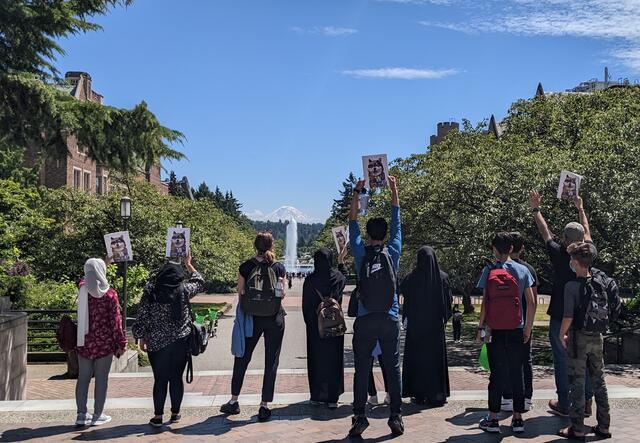
In October we had the honor of meeting two amazing teenagers, Rahima a 15-year-old Junior and her big brother Ziauddin an 18-year-old Senior. Their family arrived from Afghanistan in July. Rahima and Ziauddin were enrolled in IRC Seattle’s Youth Futures Summer Internship program to help them adjust to high school and learn about college and career preparation. “Ziauddin and Rahima are natural leaders,” says Larissa Siregar, program coordinator, “From the first day of the program, while other students shyly and respectfully nodded their heads and whispered their answers, Rahima and Ziauddin asked questions for themselves and on behalf of their peers. They also used their outgoing nature to help their fellow students grow more comfortable with each other and with the IRC Youth Team as a whole.” Rahima and Ziauddin have brought extra energy, charisma, and enthusiasm to their family’s journey of adjustment. We sat down with Rahima, Ziauddin, and their father to hear more:
What are your favorite school subjects:
Ziauddin --Math, but I like my English class because the teacher is funny and performs actions to help explain words.
Rahima —I like all of the subjects, but I like the sciences most—especially biology.
What do you like to do for fun?
Rahima —I like to do soccer and I liked the hiking we did with the IRC youth program. They taught us about how to hike, what to bring to be safe., and about local plants.
Ziauddin —I like to play cricket and soccer.
How is Washington different from your home in Afghanistan?
Rahima —It was weird to be in the same class with boys and girls. Also here there are lots of cultures and languages and people from different countries. Back home, everyone is just Afghan. Also the malls here are different—back home there is a small room and you ask for the clerk to give you something. Here in the U.S., you get to choose and collect everything and you have to go to different stores.
Ziauddin —Back home one teacher was assigned for more than one subject out of their profession, and there was more chalk and blackboards. Here we have teachers for each subject and classes here have more technology like screens and projectors. Also here, there are more traffic lights! (*Ziauddin recently received him drivers permit).
How did you feel when you first started school in the U.S.?
Rahima —at first it was terrible. I was alone with no friend. I was shy and couldn’t ask questions. The system was so different. Here there are more computers—at home in Afghanistan we didn’t use computers. But as time goes by, I’ve been learning. The best thing I’ve learned is to ask question and that I need to ask if I have a problem and need help.
Ziauddin —At first I didn’t know English and it was hard to start school. There were so many differences. But now, we have very good teachers and discussion.
What was your experience with the IRC Youth Futures Summer Internship program?
Ziauddin —It helped me know how to ask for help and get help, how to pay for college, how I can apply for scholarships, and how I can study lots of different types of subjects.
Rahima —They took us to places where we really had fun at same time as learning things. They gave us advice on how to graduate, apply for college, and choose a major, and how to think about what we love and what are our strengths and skills. It helps students to get more confident to speak their mind and ask questions. I highly recommend this program for newcomers to Washington state—my advice to them is it will help you remove your shyness and build confidence.
Rahima and Ziauddin’s father—the program prepared them for how to apply for financial aid; it was a really helpful program especially for those new in the country—it helps them know how to get help in every part of the education process. One of main reason to be in U.S. is for our children’s education. We want them to get as much as possible here. In this perspective, IRC really opened doors for us and made us aware of those things.
What are some of the goals you have beyond high school?
Rahima —I want to go to college and become a surgeon. I also want to travel around the world.
Ziauddin —I want to graduate with good grades, go to college, pass everything, and get a better job!
Who is the smartest person in your household?
Unanimously— Rahima!
Thank you for making the Youth Futures program possible. This program is for refugee youth ages 14-18 who have recently arrived in the United States. Funding from donors like you enables the program to provide transportation, student stipends, travel to field trips, books, lunches, and snacks. Your support also helps IRC Youth Futures to hire staff over the summer to provide more individualized mentorship so teens like Rahima and Ziauddin never have to feel like they are ‘going it alone.’
How you can support IRC youth program
1. Make a donation. Your gifts make it possible to provide critical services such as transportation and food during youth programs.
2. Volunteer as a youth tutor.Attend one of our volunteer orientations and get pre-screened and approved to be a tutor.
3. Share this story. Tell your family and friends about IRC's work and spread goodwill for refugee families in our community.